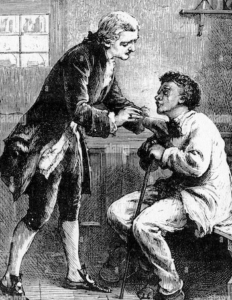
Jonathan Strong and Granville Sharpe
*The birth of Jonathan Strong is celebrated on this date in c. 1747. He was a Black slave and plaintiff in one of the earliest legal cases relating to slavery in Britain and the British abolitionist movement.
It is unknown where Strong was born, but he was brought to Britain from the British colony of Barbados by a British lawyer and slave trader, David Lisle. On July 22, 1765, Strong was baptized at St Leonard's, Shoreditch. Many enslaved Blacks at this time thought that they became free upon baptism. This prompted his enslaver to severely assault him and leave Strong on the street. Strong later made his way to the house of William Sharp, a surgeon who treated poor Londoners at his home free of charge. There, he was seen by William's brother, Granville Sharpe.
The surgeon and his brother provided Strong with money for clothes and food and arranged for his treatment at St Bartholomew's Hospital for the next four months. The Sharps paid for his treatment and found him a job as an errand runner with a Quaker friend near William Sharpe's office. Strong worked there until Lisle saw Strong as a footman on the pharmacist's coach. Viewing Strong as his property, Lisle sold him to a white-Jamaican slave trader, James Kerr, and had him kidnapped and placed in a city jail. Strong received a message from Granville Sharp, who took his case to the Lord Mayor of London, who convened those laying claim to Strong. In court, Kerr's attorney produced the sales bill from when Lisle sold Strong to Kerr.
That was insufficient to convince the Lord Mayor because Strong was imprisoned without habeas corpus or a clear cause, so he liberated Strong. Afterward, a West India captain named David Laird claimed to take Strong as Kerr's property. Sharp (advised by) the Coroner of London threatened to charge Laird with assault should he attempt to take Strong by force. Laird let go of Strong, and everyone left without further dispute.
Lisle challenged Granville Sharp to a duel, but he declined, telling Lisle that he could expect satisfaction from the law. Kerr started a lawsuit against Sharp, claiming that he unlawfully had deprived him of Strong, his property. However, because Sharp's legal arguments claimed that English law did not sanction slavery, Kerr's lawyers did not pursue the case, and Kerr had to pay treble costs in 1774, after Strong's death, for wasting the court's time. Strong remained free until he died in London on April 19, 1773. His young age at death was from beatings given by Lisle.